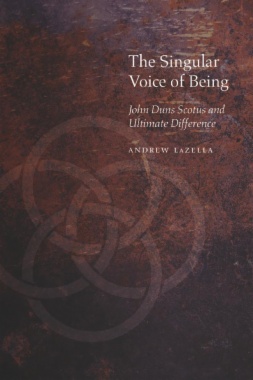The Singular Voice of Being reconsiders John Duns Scotus’s well-studied theory of the univocity of being in light of his less explored discussions of ultimate difference. Ultimate difference is a notion introduced by Aristotle and known by the Aristotelian tradition, but one that, this book argues, Scotus radically retrofits to buttress his doctrine of univocity. Scotus broadens ultimate difference to include not only specific differences, but also intrinsic modes of being (e.g., finite/infinite) and principles of individuation (i.e., haecceitates). Furthermore, he deepens it by divorcing it from anything with categorical classification, such as substantial form. Scotus uses his revamped notion of ultimate difference as a means of dividing being, despite the longstanding Parmenidean arguments against such division. The book highlights the unique role of difference in Scotus’s thought, which conceives of difference not as a fall from the perfect unity of being but rather as a perfective determination of an otherwise indifferent concept. The division of being culminates in individuation as the final degree of perfection, which constitutes indivisible (i.e., singular) degrees of being. This systematic study of ultimate difference opens new dimensions for understanding Scotus’s dense thought with respect to not only univocity, but also to individuation, cognition, and acts of the will.
- Cover�������������������������������
- THE SINGULAR VOICE OF BEING
- Title�������������������������������
- Copyright�������������������������������������������
- CONTENTS
- List of Abbreviation����������������������������������������������������������������������������
- Introduction: Solomon’s Difficulty
- Prologue����������������������������������������
- To Cut Being at Its Joints����������������������������������������������������������������������������������������������
- The Inadequacy of Thought and Language
- Vain Repetition and the Division of Being�������������������������������������������������������������������������������������������������������������������������������������������
- On What Follows�������������������������������������������������������������
- On Why It Matters�������������������������������������������������������������������
- PART I. BEING AND ULTIMATE DIFFERENCE
- 1. Being Is Said in Many Ways�������������������������������������������������������������������������������������������������������
- Univocity, Equivocity, Analogy����������������������������������������������������������������������������������������������������������
- Univocity of Being����������������������������������������������������������������������
- Aquinas and Henry on Analogy����������������������������������������������������������������������������������������������������
- Why Univocity?����������������������������������������������������������
- Thales’s Mistake
- 2. The Real Concept of Being
- Real Concepts�������������������������������������������������������
- Transcendental Quid and Quale�������������������������������������������������������������������������������������������������������
- The Double Primacy of Being
- How Does Scotus Solve the Problems of Univocity?����������������������������������������������������������������������������������������������������������������������������������������������������������������
- Putting the World Back Together Too Soon����������������������������������������������������������������������������������������������������������������������������������������
- 3. Ultimate Difference
- Ultimate Differences
- Extracategorial Difference
- The Real Basis of Ultimately Differential Concepts
- The Ground of Primary Diversity
- Termination of Quidditative Orders����������������������������������������������������������������������������������������������������������������������
- PART II. REGIONS OF ULTIMATE DIFFERENCE
- 4. The First Cut—The Intrinsic Modes of Being
- Intrinsic Modes and the Modal Distinction�������������������������������������������������������������������������������������������������������������������������������������������
- The Intrinsic Modes of Being
- Transcendental Magnitude����������������������������������������������������������������������������������������
- Infinite and Finite Magnitudes
- Nonadditive Intensity�������������������������������������������������������������������������������
- 5. Ultimate Specific Differences
- The Formal Distinction
- Ultimate versus Nonultimate Specific Differences
- Scotus’s Innovation�������������������������������������������������������������������������
- Real Community Prior to the One and Many����������������������������������������������������������������������������������������������������������������������������������������
- A Dust Cloud of Differences?
- 6. Haecceitas, or Naked Singularity�������������������������������������������������������������������������������������������������������������������������
- What Must Individuation Explain?����������������������������������������������������������������������������������������������������������������
- Matter as the Principle of Individuation����������������������������������������������������������������������������������������������������������������������������������������
- What Else Is (Not) the Principle of Individuation?����������������������������������������������������������������������������������������������������������������������������������������������������������������������
- Haecceitas as Ultimate Individual Difference
- The Threefold Comparison to Ultimate Specific Differences
- Bare Particularity versus Naked Singularity�������������������������������������������������������������������������������������������������������������������������������������������������
- Conclusion: I Wouldn’t Know Him from Adam�������������������������������������������������������������������������������������������������������������������������������������������
- The Intelligibility of Singulars
- Singular Volitions����������������������������������������������������������������������
- Postscript����������������������������������������������
- Acknowledgments�������������������������������������������������������������
- Notes�������������������������������
- Bibliography����������������������������������������������������
- Index�������������������������������

